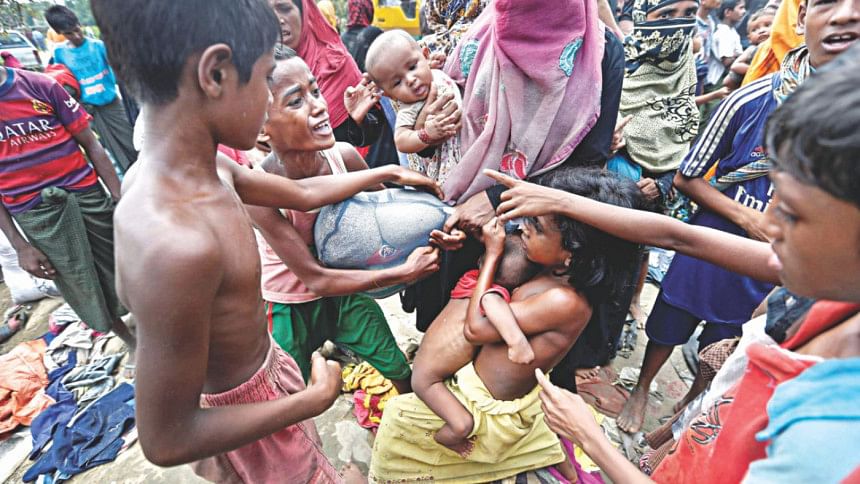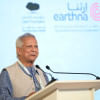Rohingya villages still burning, mines laid

Rights bodies have come up with new evidence that fires are still torching Rohingya villages in Rakhine while Myanmar military have laid landmines during attacks on villages and along the Bangladesh border.
Amnesty International has assessed three new videos taken inside Rakhine as recently as Friday afternoon showing large plumes of smoke rising from Rohingya villages as well as satellite imagery with smoke visible over burnt-out structures.
Local sources in northern Rakhine claim the fires were started by members of Myanmar security forces and local vigilante mobs, Amnesty said in a report yesterday.
"This damning evidence from the ground and from space flies in the face of Aung San Suu Kyi's assertions to the world that what she called military 'clearance operations' in Rakhine State ended on September 5," said Tirana Hassan, crisis response director of the organisation.
"Almost three weeks later, we can see in real time how there is no let-up in the campaign of violence against Rohingya in northern Rakhine State," she said.
"Not satisfied with simply forcing Rohingya from their homes, authorities seem intent on ensuring they have no homes to return to."
On September 14, Amnesty published irrefutable evidence of a mass-scale scorched-earth campaign across northern Rakhine State, where Myanmar troops and vigilante mobs have been burning down entire Rohingya villages and shooting people at random as they try to flee.
Human Rights Watch in a new report yesterday said Myanmar forces have laid landmines during attacks on villages and along the Bangladesh border, posing a grave risk to Rohingyas fleeing atrocities.
"The dangers faced by thousands of Rohingyas fleeing atrocities in Burma [Myanmar] are deadly enough without adding landmines to the mix," said Meenakshi Ganguly, South Asia director, calling upon Myanmar to immediately stop the use of antipersonnel landmines and joining the 1997 Mine Ban Treaty.

According to witness accounts, independent reporting, and photos and video recordings, Myanmarese soldiers have in recent weeks laid antipersonnel landmines at key crossing points on Burma's border with Bangladesh.
Witnesses told Human Rights Watch that Burmese military personnel also planted mines on roads inside northern Rakhine State prior to their attacks on predominantly Rohingya villages.
According to BGB officials, at least five people have been killed and 12 injured from landmine blasts.
The Landmine Monitor reported that Myanmar forces have consistently used antipersonnel mines in numerous locations along the Bangladesh-Myanmar border since 1999, but this use had been abating in recent years.
Myanmar's commander-in-chief Min Aung Hlaing, however, in a Facebook post said Rohingya militants planted a "home-made mine" that exploded in between a mosque and madrasa Buthidaung township on Friday.
He accused the militants of trying to drive out the villagers who have remained in Mi Chaung Zay, an argument that analysts say makes little sense for a group whose power depends on the networks it has built across Rohingya communities.
No one was reported injured in the explosion.
KAILASH SATYARTHI DISAPPOINTED
Meanwhile, Indian Nobel Peace laureate Kailash Satyarthi, said he is hugely disappointed with Suu Kyi's stand on the Rohingya issue, calling it among this "era's biggest humanitarian crises", reports AP.
Satyarthi said Myanmar government's handling of the crisis is "bad and unacceptable".
"Almost the entire Nobel Peace laureate community is hugely disappointed with our fellow Nobel laureate Suu Kyi. We have written to her," he said during his tour in Assam.
"The politics aside, it is a humanitarian crisis of gigantic proportions and Suu Kyi has to deal with that from that perspective."
Myanmar's de facto leader Suu Kyi has come under fire for downplaying the violence and failing to condemn the military crackdown against the Rohingyas, a marginalised group the government considers illegal "Bengali" immigrants.
UNSC MEET SOUGHT NEXT WEEK
France, Britain, the United States and four other countries have asked the UN Security Council to meet next week to discuss the ongoing violence in Myanmar, according to a request seen by AFP on Friday.
The seven countries, including Egypt, Kazakhstan, Senegal and Sweden, want UN Secretary-General Antonio Guterres to brief the council on Myanmar's military campaign.
The Ethiopian presidency of the council said it was holding consultations to set a time for the meeting, reports AFP.
US FOR URGENT ACTION
The United States wants Myanmar to take urgent action to end violence in Rakhine, a US official said on Friday, reports Reuters.
"We think, urgently, actions need to be taken to stop this violence and facilitate humanitarian assistance, lower the rhetoric, lower the tension and ... start doing the hard work to solve the longer-standing problems," US Deputy Assistant Secretary of State Patrick Murphy told reporters.
Murphy, who spent three days in Myanmar this week, said there were "many points of responsibility" and he wanted to see everyone follow through on commitments Suu Kyi made to uphold rights and the law in an address to the nation on Tuesday.
"There's the elected government, there are the security forces which have authorities that don't fall under the purview of the civilian elected government, there are local leaders and there is the broader population, among which there are many emotions and many tensions," he said.
"Significant responsibility sits with security authorities and local officials in Rakhine state and we are looking for their cooperation to make these commitments a reality," Murphy told reporters on a conference call from Bangkok.
The Trump Administration is considering limiting US ties with Myanmar's military in response to its recent violence against the country's Rohingya Muslims, Time magazine reported on Thursday quoting a White House official.
"Until Burma's security forces act in accordance with the rule of law and stop the violence and displacement, moving forward with such engagement will be difficult," a National Security Council spokesperson told the magazine.
In another development, Saudi Arabia yesterday condemned the government of Myanmar's "policy of repression" against minority Rohingya Muslims.
"My country is gravely concerned and condemns the policy of repression and forced displacement carried out by the government of Myanmar against the Rohingya minority," Foreign Minister Adel al-Jubeir said in a speech at the United Nations General Assembly.
'SEPARATE CRISIS'
Pierre Peron, spokesman for the UN Office for the Coordination of Humanitarian Affairs in Myanmar, said a separate crisis is unfolding on multiple fronts, reports Reuters.
"Many ongoing humanitarian activities that existed before August 25 have still not resumed," said Peron. In northern Rakhine, tens of thousands of people, most of them Rohingya, are displaced but haven't crossed into Bangladesh.
Closer to Sittwe, 1,40,000 Rohingyas displaced by previous religious unrest are confined to squalid camps. They depend on foreign aid that has been severely restricted since August 25.
"For the sake of vulnerable people in all communities in Rakhine State, urgent measures must be taken to allow vital humanitarian activities to resume," Peron said.

 For all latest news, follow The Daily Star's Google News channel.
For all latest news, follow The Daily Star's Google News channel. 








Comments